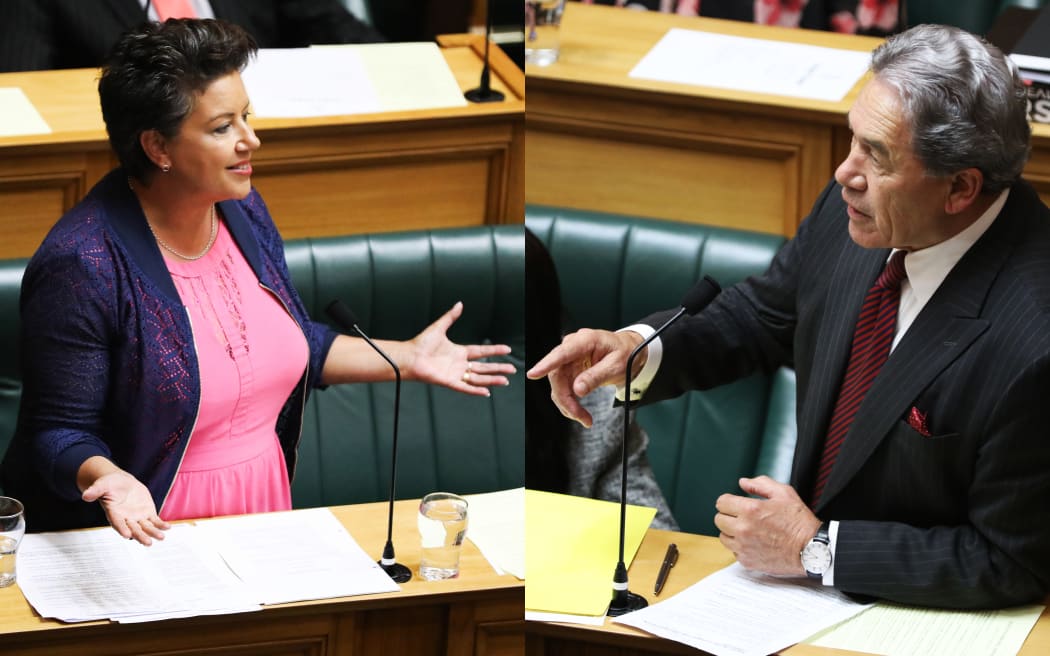Burning a Government Minister with a question so fire they need some aloe vera to recover is the dream of many Opposition MPs.

National Deputy Leader Paula Bennett (left) and Deputy Prime Minister Winston Peters (right) in the House. Photo: VNP / Daniela Maoate-Cox / Phil Smith
To make this dream a reality MPs will often push the boundaries of what is and isn’t allowed in the House but they don’t always get away with it.
In Question Time this week there were a couple of tricky situations over what a Minister is and isn’t responsible for involving National’s Deputy Leader Paula Bennett and Deputy Prime Minister Winston Peters.
A little background on Question Time:
-
Technically called Questions for Oral Answer it normally starts just after 2pm on a sitting day and usually lasts between 1 - 1.5 hours.
-
Total of twelve questions to Ministers asked by any other MP and occasionally extra questions to MPs are allowed.
-
Questions must be lodged with the Office of the Clerk in the morning to make sure they follow the rules. It also gives Ministers a chance to figure out an answer.
-
There are a certain number of follow up or supplementary questions allocated to each party. The question-asker gets to ask the first supplementary but after that, anyone can jump in.
-
Ministers can only be asked questions about what they are responsible for.
That last point is where MPs sometimes tread a fine line.
On Wednesday Paula Bennett asked Winston Peters “Does he stand by all his statements and actions?”.
On the surface it seems like a nothing question but it serves a wider purpose. A general question like this doesn’t break the rules and it doesn’t give away the angle so Ministers have to guess what topic they’ll be asked about.
All was revealed in Paula Bennett’s supplementary question: “does he stand by his media statement put out as Rt Hon Winston Peters, Deputy Prime Minister, released on 26 March 2018?”
But the question was blocked by the Speaker Trevor Mallard who said:
“Order! As I indicated yesterday, after looking at that statement, the content of that statement is not a responsibility of the Deputy Prime Minister. That question is ruled out.”
On Tuesday Paula Bennett had asked a similar question; the general one at first and then a question about a statement from the Deputy Prime Minister’s office.
The problem is the Deputy Prime Minister is not actually responsible for that much. They’re more of a substitute tasked with holding the fort when the Prime Minister is elsewhere.
But many MPs hold various roles. For example Winston Peters is:
-
Deputy Prime Minister
-
Minister of Foreign Affairs
-
Minister of Racing
-
Minister of State Owned Enterprises
-
Leader of New Zealand First and List MP
Trying to figure out which hat an MP was wearing when they said or did a particular thing is the confusing part and in this case the Speaker had decided that the Deputy Prime Minister wasn’t responsible for the statement even though it had his name on it.
“I think you have to go quite a lot further than mislabelling a statement in order to bring something into ministerial responsibility,” said Trevor Mallard.
“He might be responsible for mislabelling a statement, but there are areas which he is not responsible for, and the activities of Ministers, as was made very clear by the Prime Minister, as all senior members of the Opposition will know, is a matter for the Prime Minister and not the Deputy Prime Minister.”
Back to Wednesday’s question. After some back and forth between National and the Speaker Paula Bennett was allowed to continue.
She asked why the “Deputy Prime Minister put out a statement on Monday under the heading of "Deputy Prime Minister" when now we are informed that he has no responsibility for the content?”
That question was ok but a follow up question on the behaviour of two other New Zealand First MPs “avoiding media questions” wasn’t.
“The member cannot answer it because that is not an area that he has any ministerial responsibility for,” Trevor Mallard said.
This is another area of trickiness. Ministers are not responsible for other MPs, a party, or other Ministers so Question Time can’t be used to call them out on those issues.
Only one person is responsible for other Ministers and that is the Prime Minister.
Even when MPs fail to get away with it the benefits of pushing the rules to make a point often outweigh the negatives because it’s pretty hard to make people un-hear a statement; no matter how frustrating it is for the Speaker.


